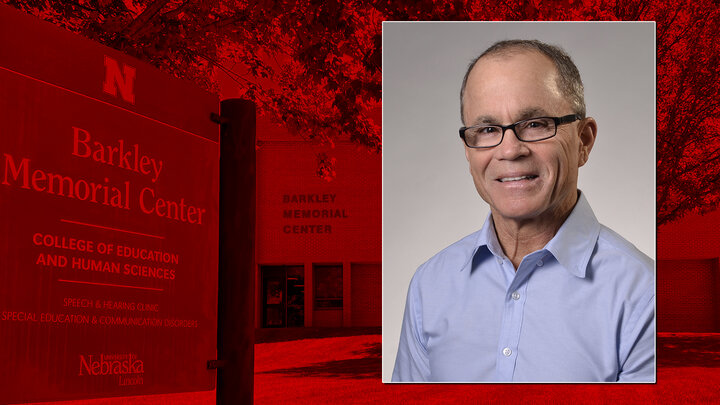After dedicating more than 30 years of his life to the field of special education, including the last 21 at the University of Nebraska-Lincoln, Ron Nelson is retiring at the end of June.
Nelson currently serves as the interim chair of the Department of Special Education and Communication Disorders , and the Larry & Sharon Roos Family Professor of Special Education. His expertise spans a range of areas for special needs, including learning technologies, English language literacy, emotional and behavioral disorders, positive behavioral interventions and supports, and risk factors for behavior and learning problems.
Despite the fact he has built a decorated career in the field, special education was not his original career path. Nelson earned bachelor’s degrees in plant science at the University of Wisconsin-River Falls, and in agricultural/secondary science at the University of Wisconsin-Madison.
When his twin brother sustained a severe traumatic brain injury in a motorcycle accident, Nelson served as his caregiver and special education became his focus. He used applied behavior analysis strategies to rebuild his brother’s skills to a point he could live independently.
Nelson went on to earn his master’s degree in special education at Eastern Montana College and his doctorate in special education/Educational Psychology at Utah State University. While working with Alan Hofmeister at Utah State, Nelson found his niche in the field.
“My work with him provided me the opportunity to learn instructional design principles and procedures, and field-based research procedures, which I have used throughout my career to develop effective interventions that have been recognized by the What Works Clearinghouse and other evidence-based clearinghouses.”
Nelson was a post-doctoral fellow at the University of Illinois at Chicago. He held faculty positions at Eastern Washington University and Arizona State University, before arriving at Nebraska in 2000. The strong reputation of the Barkley Memorial Center and its faculty are what initially made him interested in a career a Nebraska.
“The Barkley Memorial Center provided access to support and research/training facilities rarely found at other institutions of higher education,” Nelson said. “The current addition and upgrade to the Barkley Center’s facilities represent the continual striving to improve research and training experiences of faculty and students.”
During his career, Nelson has published more than 130 peer-reviewed articles, 20 book chapters and 11 books. He has also garnered more than $26 million in grant funding, and published 17 curriculum and two assessment tools that continue to help children around the world achieve maximum potential for learning.
Improving the learning and behavioral outcomes of children with disabilities has remained the focus throughout Nelson’s career. He is especially proud of the interventions he developed and the positive effect those have had on countless children. His intervention program, Stepping Stones to Literacy, is used by schools in all 50 states. ClickNRead Phonics is used by more than 2 million children in all 50 states and 100 countries worldwide.
“The support and research facilities at Nebraska are second to none,” Nelson said. “These, along with smart colleagues to collaborate with, enabled me to advance my career and research efforts.”
Nelson’s biggest advice to faculty in the early stages of their careers are to make wise decisions and choices about how they spend their time.
“Faculty careers develop over time,” Nelson said. “Along the way, faculty are free to make decisions and choices about how they spend their time and about what they do. ‘Yes’ to a new commitment today also means ‘no’ to a current or future opportunity.”
As he prepares to maximize his time as a grandpa, while also doing more traveling and writing a book, Nelson reflects on the last two decades he has spent as a Husker.
“I’ve truly enjoyed my time at Nebraska. I look forward to the continued success of the Barkley Center.”
Special Education and Communication Disorders
College of Education and Human Sciences




